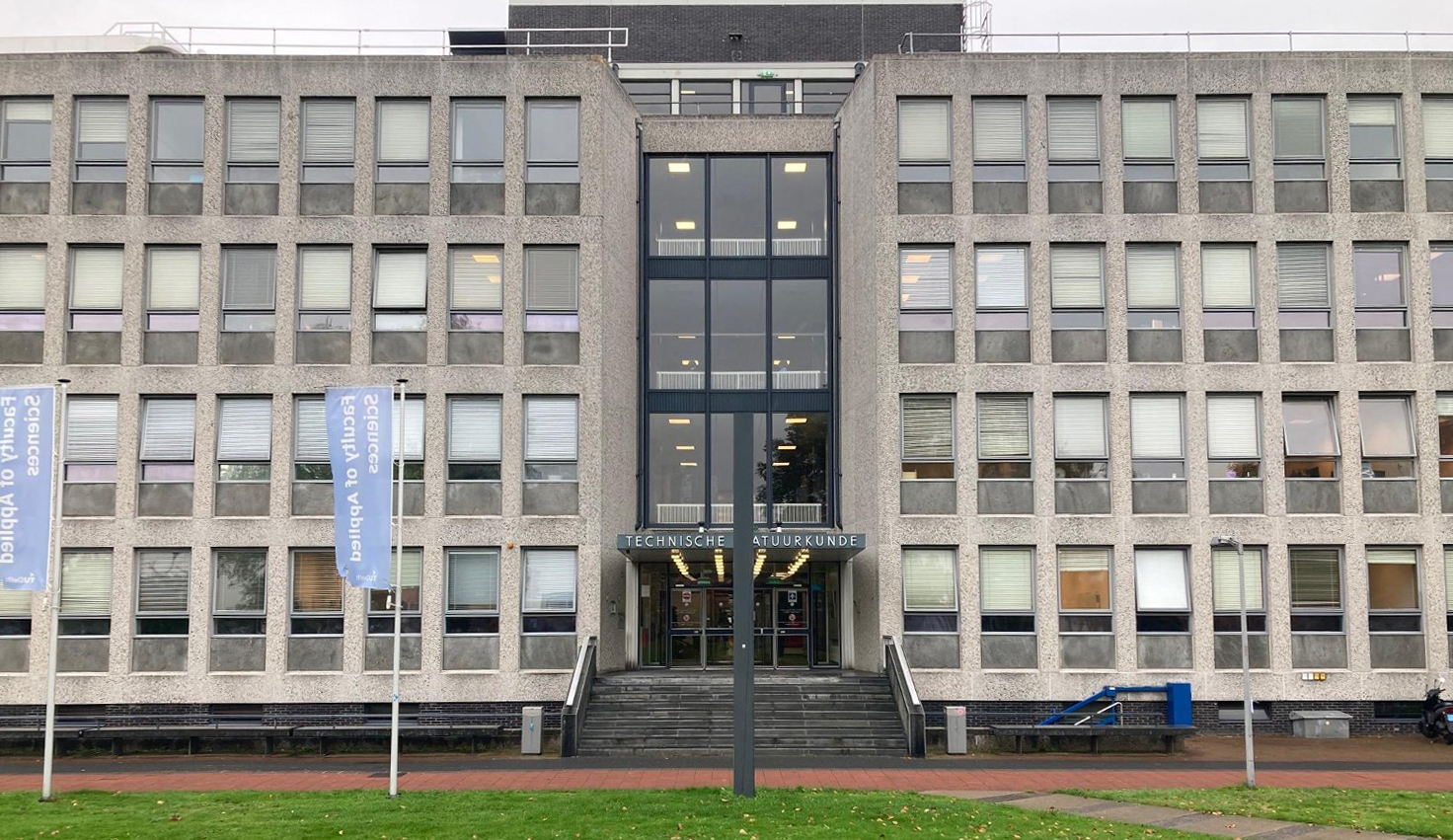The science communication course will no longer be welcome at the AS Faculty from next summer. Registrations have been stopped. Why is that and what now?
The science communication course will have to leave the Applied Physics building next summer. (Photo: Jos Wassink)
The reshuffle came to light through a message from SciCom NL, an organisation of science communication professionals. SciCom’s Board, with TU Delft science communication professionals Roy Meijer and Aldo Brinkman on board, expressed its surprise at the closure of the track communication design for innovation (CDI). “The Recognition and Appreciation programme is increasingly taking shape in the academic field, and in addition to education and research, it recognises the great importance of sound science communication. The demand for expertise in this field is only going to increase with Recognition and Appreciation, which is why for this reason alone it would be very unfortunate if a course in this field were to disappear,” writes the Board.
What’s up? Paulien Herder, dean of the Faculty of Applied Sciences (AS) since March 2021, decided in August to close the graduate program in science communication. She confirmed this by email, saying that an ‘extensive orientation’ preceded this. The track CDI, which was known as science communication until 2019, currently forms the master’s programme in science education and communication (SEC) together with the track science education (the teacher training programme). The eponymous department is housed in the old engineering physics building.
According to Herder, there is ‘a bad match’. “The current CDI education does not fit into the faculty’s strategic education portfolio. That consists of socially relevant education at the interface of natural sciences and engineering.” The teacher training programme, however, will remain unaffected.
‘We foster a good hope for a nice new place’
This has no consequences for the current students, assures Herder. “For all master students currently taking the CDI programme, the guarantee for the completion of the programme will be fulfilled by the AS Faculty in accordance with TU Delft regulations.”
Relevance
SciCom does not see the logic. It speaks (Dutch only) of a ‘worldwide unique’ research and education that is now under threat of disappearing. “The group distinguishes itself in the broad field of science communication by its focus on applied research into the public-private interaction and collaboration between scientists, engineers, policymakers and business developers.”
Staff and students of the science communication track are mainly busy finding new possibilities. “For now it’s most important that students are able to complete their education,” says Caroline Wehrmann, who set up the CDI master’s with Dr Maarten van der Sanden and others. Not wanting to be negative, she focuses on talks with colleagues at other faculties ‘to accommodate our research and teaching’.
SEC student Sybe Andringa, Secretary of the Intersection study association, articulates the same attitude. “Naturally, as students and as a study association, we are very shocked by the news that Applied Sciences is closing the CDI track. However, we will look ahead and are hopeful that a nice new place will be found for this study. Our students and study association are actively thinking about options with the CDI teachers.”
Numbers
Vice President of Education and Executive Board member Rob Mudde confirms there is ‘a search process now underway at TU Delft’. He hopes that in another place the master will attract more students. “The track has remained below target since its inception. The number of students entering annually remained below the standard set in Delft of a minimum of 20 students per year. A higher intake could perhaps be achieved with a better fit in a different course portfolio.”
Note: in 2020 the master choice of one student was not recorded. We have divided the student over both tracks. TU Delft, a small but according
Blooming field
A to experts unique department is in search of a new home for their teaching and research. Elsewhere in the Netherlands, science communication is flourishing. Just before the summer, Minister of Education Dijkgraaf took the initiative (in Dutch) for a National Centre for Science Communication (capitalised this time). At Leiden University, Ivo van Vulpen has been appointed Professor of Science Communication, alongside Ionica Smeets. At Eindhoven (TU/e), NRC science journalist Margriet van der Heijden has fulfilled that role part-time since the end of last year. So where does that leave TU Delft, you might ask.
Mudde sees it differently. “You could also argue that because Leiden puts extra effort into science communication, it ensures focus and mass there. For interested students, Leiden is 20 km away. We have very good cooperation with Leiden in the LDE (Leiden, Delft, Erasmus – jw) context. Why should there be everything everywhere? I think it is a good idea to jointly ensure sufficient supply and not to fall into the trap that everyone must do everything.”
- Next summer, the Public Communication of Science and Technology (PCST2023) world congress will take place in Rotterdam under the chairmanship of Dr Maarten van der Sanden (CDI, TU Delft). According to SciCom, the fact that the congress is being held in Europe for the second time is a token of appreciation for the TU Delft group. “Normally, conferences ‘rotate’ across different continents, so this says something about the appreciation the international community has for this group and its education and research.”
Update 07-11-2022:
More than twice as many students choose to pursue a minor in science communication or education instead of one of the master’s programmes. The future of the minors is currently uncertain. In fact, it depends on ongoing negotiations with various faculties, Wehrmann informs.
Do you have a question or comment about this article?
j.w.wassink@tudelft.nl


Comments are closed.